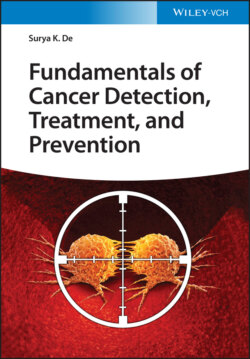Читать книгу Fundamentals of Cancer Detection, Treatment, and Prevention - Surya K. De - Страница 52
2.2 Hormones
ОглавлениеEstrogens are a group of hormones that function in human sexual and reproductive development, mostly in women. Although these hormones have essential physiological roles in both sexes, they have also been linked with an increased risk of many cancers. For example, undertaking combined menopausal hormone therapy, consisting of estrogen plus progestin (a synthetic version of the female hormone progesterone), can increase the risk of breast cancer in women. Menopausal hormone therapy using estrogen alone may increase the risk of endometrial cancer, and it is used only in women who have had a hysterectomy. Women considering menopausal hormone therapy should discuss possible risks and benefits with a medical specialist.
Researchers have discovered that a woman's risk of breast cancer is related to the estrogen and progesterone produced by her ovaries, which are known as endogenous estrogen and progesterone [1–12]. Exposure to a high level of these hormones, or over a lengthy period of time, has been associated with an increased risk of developing breast cancer. High levels of exposure can be caused by starting menstruation early, going through menopause late, having a first pregnancy late in life, or never giving birth. Conversely, however, giving birth is also a protective factor with regard to developing breast cancer.
Regarding cervical cancer, it has been demonstrated that using birth control pills may increase a woman's risk of developing this type of cancer. However, there is also evidence linking birth control pills with lower frequency of other types of cancer, such as endometrial (uterus), colorectal, and ovarian.
